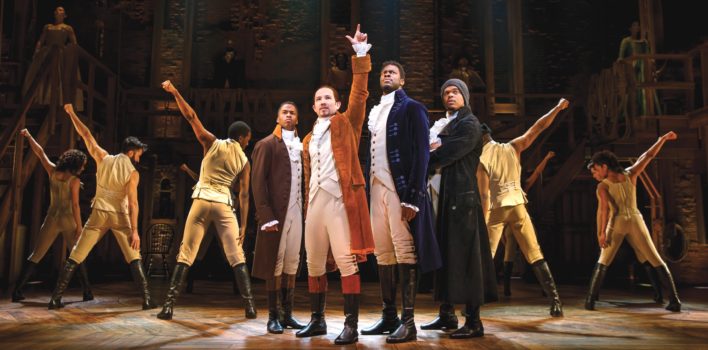Hamilton: Racial Reconciliation or Revolutionary Revisionism?
 Three years ago, I was mortified when my teenage daughter became obsessed with Lin-Manuel Miranda’s award-winning Broadway musical Hamilton, with its suggestive lyrics and revisionist history. Hamilton’s brilliant hip-hop soundtrack and talented, racially-diverse cast eventually won me over, especially as fellow teachers praised the way the musical had encouraged their students’ interest in early American history. Moreover, Hamilton’s central themes of racial reconciliation and human dignity are timely and culturally relevant.
Three years ago, I was mortified when my teenage daughter became obsessed with Lin-Manuel Miranda’s award-winning Broadway musical Hamilton, with its suggestive lyrics and revisionist history. Hamilton’s brilliant hip-hop soundtrack and talented, racially-diverse cast eventually won me over, especially as fellow teachers praised the way the musical had encouraged their students’ interest in early American history. Moreover, Hamilton’s central themes of racial reconciliation and human dignity are timely and culturally relevant.
Who Lives, Who Dies, Who Tells Your Story
Just as his play transforms the skin-tones of slave-owning founding fathers, Lin-Manuel Miranda paints Alexander Hamilton in a much rosier light than history, blurring character defects and ignoring actions and writings that contradict his portrayal of the founding father as a “revolutionary manumission abolitionist.” In this case, artistic license pays off beautifully. By showcasing Hamilton’s contributions, Miranda makes the point that, far from being a drag on society and American ideals, “young, scrappy, and hungry” immigrants such as Hamilton and ‘fighting Frenchman’ Marquis de Lafayette positively contributed to our young nation’s ideas and ideals. To slightly alter the most applause- generating line in the musical, this son of immigrants gets the job done. The play premiered near the end of the second term of our nation’s first African American president, a contrast to an increase of racist rhetoric that used to be universally condemned in this country.

“America Then, Told By America Now”
In an interview with The Atlantic, Miranda describes his Broadway hit as, “A story about America then, told by America now.” While the play’s success and the activist efforts of its writers and cast have added to the national conversation, there are inherent problems with painting historical figures in an ideal light that ignores their flaws. Though in the above interview Miranda speaks of, “An enormous responsibility to be as historically accurate as possible,” Alexander Hamilton’s own writings show he was no champion of diversity or immigrants. In an address to newly elected President Thomas Jefferson, Hamilton wrote:
The influx of foreigners must, therefore, tend to produce a heterogeneous compound; to change and corrupt the national spirit; to complicate and confound public opinion; to introduce foreign propensities. In the composition of society, the harmony of the ingredients is all-important, and whatever tends to a discordant intermixture must have an injurious tendency.
—Alexander Hamilton, Examinations of Jefferson’s Message to Congress of December 7th, 1801
The problem with burying the sins of our forefathers is a cliché worth repeating: those who forget the past tend to repeat it. Following their miraculous exodus from slavery, the Israelites did not waste time concocting their own revisionist history. Less than one month after God liberated them from Egyptian slavery, the people of Israel confronted their leaders:
There, too, the whole community of Israel complained about Moses and Aaron.“If only the Lord had killed us back in Egypt,” they moaned. “There we sat around pots filled with meat and ate all the bread we wanted. But now you have brought us into this wilderness to starve us all to death.”
—Exodus 16:2-3, NLT
“What Comes Next?”
How do we take action in the present in order to tackle racism? Take cues from the titles of three Hamilton songs:
- “Say No to This”

The first step is admitting that racism exists and confronting internal and external biases based on race, religion, or country of origin. Be the voice for change, both within and without.
- “The World is Wide Enough”

Rather than being color-blind, celebrate the beautiful array of colors and cultures around us. Take time to get to know individuals of different backgrounds in our neighborhoods, jobs, schools, and churches. Ask questions and listen well; love and interest in our fellows models Christ’s love for us.
- “I Know Him”
 Finally, emulate our Savior’s actions and attitude toward racism and “the least of these.” Jesus honored Samaritans, Gentiles, and women, despite rampant discrimination and misogyny during his lifetime. More importantly, we must know God. Maintain a relationship with the Lord, ever praying for a heart like his. After all, “The Lord doesn’t see things the way you see them. People judge by outward appearance, but the Lord looks at the heart.” —1 Samuel 16:7b, NLT
Finally, emulate our Savior’s actions and attitude toward racism and “the least of these.” Jesus honored Samaritans, Gentiles, and women, despite rampant discrimination and misogyny during his lifetime. More importantly, we must know God. Maintain a relationship with the Lord, ever praying for a heart like his. After all, “The Lord doesn’t see things the way you see them. People judge by outward appearance, but the Lord looks at the heart.” —1 Samuel 16:7b, NLT
• • •
Last month, Disney and Lin-Manuel Miranda announced that Hamilton is coming to a movie theater near you October 15, 2021.







